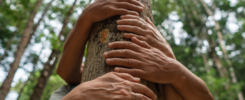Field Studies Ireland specialises in curriculum focused outdoor teaching through place-based education, in a range of outdoor environments, including:
- Rivers
- Coastal
- Woodland
- Freshwater
- Urban
- and more
Our staff are highly qualified in outdoor teaching and our lessons are tailored to specifically meet the needs of your group, subject and field study requirements.
Each lesson is fully delivered by Field Studies Ireland staff, with all equipment and resources provided, including pre and post-course digital support.
Please get in touch via email and a member of our education team will provide you with specific information regarding your field study.
Get in touch to find out more Bookings@fieldstudies.ie
Place-based learning is a powerful educational approach that connects students to their local environment and community. Here are some key facts on why place-based learning is beneficial for the development of children:
- Contextual Relevance: Place-based learning provides a real-world context for academic subjects, making the learning experience more relevant and meaningful for students. When children see the connections between what they’re learning and their surroundings, it enhances understanding and retention.
- Increased Engagement: Learning in familiar environments captures the attention and interest of children. By utilizing local spaces, teachers can create engaging and interactive lessons that stimulate curiosity and foster a love for learning.
- Holistic Learning: Place-based learning encourages a holistic approach to education, integrating various subjects into a comprehensive understanding of a specific place. Students can explore science, history, mathematics, and literature through the lens of their local environment.
- Cultural Connection: Engaging with the local community and environment allows children to develop a deeper understanding of their own culture, heritage, and traditions. It fosters a sense of pride and connection to their roots.
- Environmental Stewardship: Place-based learning often involves exploring and understanding the natural world. This not only promotes environmental awareness but also instills a sense of responsibility and stewardship for the local ecosystem.
- Critical Thinking Skills: Working within their community and environment challenges students to think critically and solve real-world problems. They learn to analyze issues, consider multiple perspectives, and develop solutions that have practical applications.
- Social Skills and Collaboration: Place-based learning frequently involves collaborative projects and community interactions. Children learn to work together, communicate effectively, and build relationships with peers and community members.
- Physical Health and Well-being: Outdoor education, a common aspect of place-based learning, promotes physical activity and a healthy lifestyle. Spending time in nature has been linked to improved mental health, reduced stress, and increased overall well-being.
- Life-Long Learning Habits: Place-based learning nurtures a love for learning that extends beyond the classroom. Children are more likely to develop a curiosity about their surroundings and continue seeking knowledge throughout their lives.
- Global Awareness: While place-based learning focuses on the local environment, it also contributes to a broader understanding of global issues. By understanding the interconnectedness of local and global challenges, children can become more informed and responsible global citizens.
Incorporating place-based learning into education not only enriches the academic experience but also contributes to the holistic development of children, fostering a sense of belonging, curiosity, and responsibility towards their community and the world at large.


